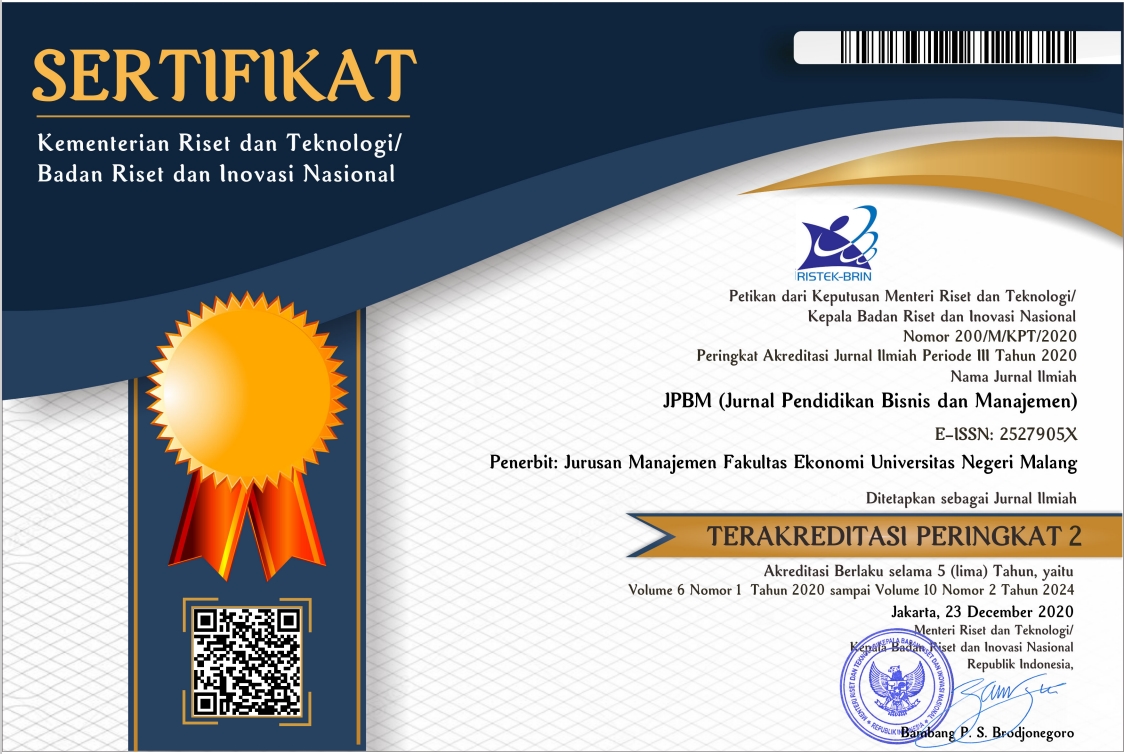Academic Climate Reinforcement in An Effort of Establishing Start-ups Based on Student Business Determination
Abstract
This study aims to confirm the role of students' business
determination after completing entrepreneurship courses on productive
behavior by reinforcing the academic climate experienced by students and
ensuring the role of strong ideals and enthusiasm among students. This
research primarily focused on students who have completed
entrepreneurship courses in various study programs at the University of
Mataram. The study involved students' attitudes in the form of determination
that reflect the strong aspirations and enthusiasm of doing business and their
influence on efforts to realize entrepreneurial intentions, in establishing novel,
creative, innovative and innovative technology-based startup. It also
measured how dare the students to take measurable risks. It comprehensively
proved that student entrepreneurial behavior can be established on the basis
of a strong desire to become entrepreneurs from the beginning of study, with
the support of business knowledge and skills and strengthening the academic
climate that creates psycho-social conditions such as academics.
Keywords
Full Text:
PDFReferences
Arruti, A., & Paños-Castro, J. (2020). International entrepreneurship education for pre-service teachers: A longitudinal study. Education + Training, 62(7/8), 825–841. doi: 10.1108/ET-04-2020-0098
Åstebro, T., Bazzazian, N., & Braguinsky, S. (2012). Startups by recent university graduates and their faculty: Implications for university entrepreneurship policy. Research Policy, 41(4), 663–677. doi: 10.1016/j.respol.2012.01.004
Audretsch, D. B. (2014). From the entrepreneurial university to the university for the entrepreneurial society. The Journal of Technology Transfer, 39(3), 313–321. doi: 10.1007/s10961-012-9288-1
Audretsch, D. B., & Lehmann, E. E. (2005). Does the Knowledge Spillover Theory of Entrepreneurship hold for regions? Research Policy, 34(8), 1191–1202. doi: 10.1016/j.respol.2005.03.012
Bailetti, T. (2011). Fostering Student Entrepreneurship and University Spinoff Companies. Technology Innovation Management Review, 1(1), 7–12.
Boldureanu, G., Ionescu, A. M., Bercu, A.-M., Bedrule-Grigoruță, M. V., & Boldureanu, D. (2020). Entrepreneurship Education through Successful Entrepreneurial Models in Higher Education Institutions. Sustainability, 12(3), 1267. doi: 10.3390/su12031267
Chen, X.-P., Yao, X., & Kotha, S. (2009). Entrepreneur Passion and Preparedness in Business Plan Presentations: A Persuasion Analysis of Venture Capitalists’ Funding Decisions. The Academy of Management Journal, 52(1), 199–214.
Donnellon, A., Ollila, S., & Williams Middleton, K. (2014). Constructing entrepreneurial identity in entrepreneurship education. The International Journal of Management Education, 12(3), 490–499. doi: 10.1016/j.ijme.2014.05.004
Drucker, P. F. (1985). Innovation and Entrepreneurship: Practice and Principles (SSRN Scholarly Paper No. ID 1496169). Rochester, NY: Social Science Research Network. Diambil dari Social Science Research Network website: https://papers.ssrn.com/abstract=1496169
Kuratko, D. (2005). The Emergence of Entrepreneurship Education: Development, Trends, and Challenges. Entrepreneurship Theory and Practice, 29, 577–598. doi: 10.1111/j.1540-6520.2005.00099.x
Li, L., & Wu, D. (2019). Entrepreneurial education and students’ entrepreneurial intention: Does team cooperation matter? Journal of Global Entrepreneurship Research, 9(1), 35. doi: 10.1186/s40497-019-0157-3
Liguori, E., & Winkler, C. (2020). From Offline to Online: Challenges and Opportunities for Entrepreneurship Education Following the COVID-19 Pandemic. Entrepreneurship Education and Pedagogy, 3(4), 346–351. doi: 10.1177/2515127420916738
Lilien, G. L., & Grewal, R. (2012). Handbook on Business to Business Marketing. Edward Elgar Publishing.
Liñán, F. (2004). Intention-Based Models of Entrepreneurship Education. Piccola Impresa / Small Business, 2004, 11–35.
Martin, B. C., McNally, J. J., & Kay, M. J. (2013). Examining the formation of human capital in entrepreneurship: A meta-analysis of entrepreneurship education outcomes. Journal of Business Venturing, 28(2), 211–224. doi: 10.1016/j.jbusvent.2012.03.002
Matt, M., & Schaeffer, V. (2018). Building Entrepreneurial Ecosystems Conducive to Student Entrepreneurship: New Challenges for Universities. Journal of Innovation Economics, n° 25(1), 9–32.
Murnieks, C., & Mosakowski, E. (2006). Entrepreneurial passion: An identity theory perspective.
Nabi, G., Holden, R., & Walmsley, A. (2006). Graduate career‐making and business start‐up: A literature review. Education + Training, 48(5), 373–385. doi: 10.1108/00400910610677072
Ndirangu, M., & Bosire, J. (2004). Student Entrepreneurship on Campus: A Survival Response or a Career Rehearsal? The Case of Egerton University Student Entrepreneurs. Eastern Africa Social Science Research Review, 20(1), 51–66.
Ozaralli, N., & Rivenburgh, N. K. (2016). Entrepreneurial intention: Antecedents to entrepreneurial behavior in the U.S.A. and Turkey. Journal of Global Entrepreneurship Research, 6(1), 1–32. doi: 10.1186/s40497-016-0047-x
Yıldırım, N., Çakır, Ö., & Aşkun, O. B. (2016). Ready to Dare? A Case Study on the Entrepreneurial Intentions of Business and Engineering Students in Turkey. Procedia - Social and Behavioral Sciences, 229, 277–288. doi: 10.1016/j.sbspro.2016.07.138
Refbacks
- There are currently no refbacks.
JPBM (Jurnal Pendidikan dan Bisnis Manajemen) is licensed under a Creative Commons Attribution-NonCommercial-ShareAlike 4.0 International License.
JPBM (Jurnal Pendidikan dan Bisnis Manajemen) is abstracted and indexed in :
















